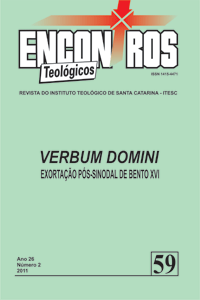A Palavra de Deus no Antigo e no Novo Testamento
DOI:
https://doi.org/10.46525/ret.v26i2.230Resumen
Resumo: O artigo começa com a investigação do problema da hermenêutica
da palavra de Deus, na época do movimento do “modernismo” no fim do séc.
XIX e começo do séc. XX. Uma visão de conjunto da Sagrada Escritura trata
dos livros da Bíblia como literatura funcional. A seguir, são abordados os arautos
da palavra de Deus no AT e NT e seu papel na comunidade de fé. A influência
da palavra de Deus, na faculdade do intelecto e da vontade, é determinante no
comportamento humano. A tipicidade cultural, do mundo hebraico e helênico,
desvenda os traços significativos dos respectivos livros bíblicos. Por fim, se
analisa o prólogo do Evangelho de João para apresentar a pessoa de Jesus
Cristo, como personificação da Palavra de Deus na vida trinitária e, na relação
com a humanidade.
Abstract: The article begins by investigating the problem of hermeneutics concerning
the word of God in connection with the crisis of the movement of “modernism”
at the end of the 19th and the beginning of the 20th century. A comprehensive view
of the Sacred Scriptures envisages the books of the Bible as functional literature.
The following chapter focuses upon the messengers of the word of God in the
OT and NT taking into account their role in the faith community. Further, the
influence of the word of God on one’s intellect and will is studied so as to find out
why they make their each and every move determining human behavior. New
insight is to be gained by working out the literary approach of the word of God
in the context of disparate cultures and diverse differentiations which occurred
both in Hebraic and Hellenistic thought patterns, which are exemplified in the
biblical books of the OT and NT. In the final chapter the personified word of God
by Jesus Christ is considered by means of a detailed analysis of the Prologue
of the Gospel of John in order to ascertain the divine role within the Trinity and
in the relationship between God and the world.



